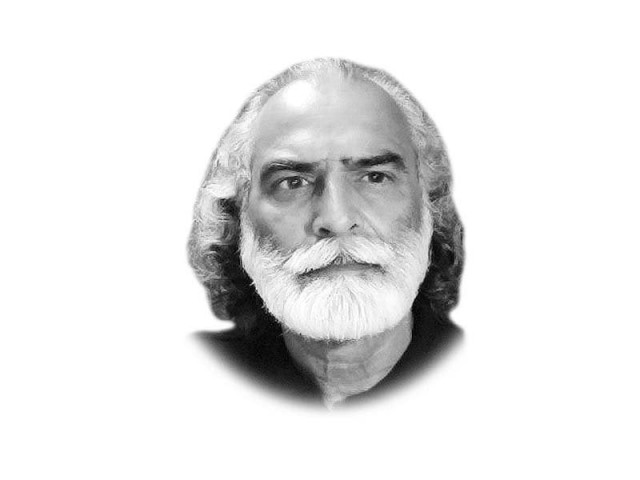The rigging equilibrium
The time has come to formulate a proportionate representation system that eliminates the incentive to rig

The writer works with Pattan Development Organisation
Sadly, most candidates commit this corrupt practice but in such a sophisticated manner that it is extremely difficult to observe it. This rigging is based on two principles — keep it at the lowest minimum level and spread it out at an optimum level and let the opponent do the same. This has become a norm and, therefore, this may be termed a ‘rigging equilibrium’. Any rigging that takes beyond this level could cause outrage. The best analogy I could find in this regard is adulteration of water in milk. If you add 10 per cent water in the milk, no one can discover this just by looking at the milk, but if you add 50 per cent water, the milk would definitely start looking like lassi. And this would definitely cause serious trouble.
Now let us examine the results of the 2013 general elections. Most commentators and scholars ignored that the margin of victory was less than 10 per cent in around 90 and less than five per cent in around 45 National Assembly constituencies. My hypothesis is that like a ‘clever’ milk adulterer, a contesting candidate can enhance the probability of his victory by manipulating polling in about 15 per cent of polling booths and the counting processes in around 50 per cent polling booths. This is easy to manage and hide, hence difficult to catch.
Consider this arithmetic. On average, a National Assembly constituency consists of 250 polling stations, having roughly 1,500 votes per polling station. If a candidate manipulates 15 per cent of the polling and counting processes in 50 per cent (125) polling stations, he could change the results in his favour. Let us assume that in each polling station, he manages to poll 20 fake votes; add another 15 votes in his favour at the time of result preparation as well as spoiling 10 votes of his nearest rival (in 35 National Assembly seats the margin of victory was less than the rejected number of votes). On average, the candidate gains 45 votes through this highly sophisticated method. Now multiply this with 125 polling stations. In total, he enhances his vote bank by 5,625 votes. It is worth stating that in 45 National Assembly constituencies, the margin of victory was less than 5,500.
It was interesting to read the preliminary election observation reports of the European Union (EU) and the Human Rights Commission of Pakistan (HRCP) regarding the 2013 elections. A person is either healthy or not. Similarly, an election is either fair and free or not. The EU report stated that they found irregularities in about nine per cent of polling stations that were observed. The HRCP findings were largely similar to the EU’s. Though they both deserve admiration for identifying ‘irregularities’, they drew the wrong conclusions. They said that the elections were largely credible. This paved the way to argue that the polls were conducted largely in a fair and free manner. I disagreed with their conclusion then and my opinion remains unchanged today.
It seems that in the 2013 general election, some state institutions helped certain parties cross this limit, which we have termed the ‘rigging equilibrium’. As stated above, too much water adulteration can make it obvious that the milk is not pure. Whenever this limit was crossed wildly, it generated huge rage and caused instability. This happened in the 1977 and 1990 elections too. In the aftermath of the 2013 polling, almost every contesting party was found protesting somewhere in the country. This was unprecedented and made the election the most controversial since the 1977 polls. I said the same to the then secretary election commission.
No wonder when the judicial commission was established to probe alleged rigging in the 2013 elections, more than two dozen political parties filed petitions. The Free and Fair Election Network, which had deployed more than 40,000 observers, also filed a petition. We had strong reasons for doing this. We recorded more than 70,000 irregularities across Pakistan and found serious discrepancies in the election commission polling scheme and election results. Certain patterns could be found. For instance, wherever polling bags were opened for scrutiny, most ballots could not be verified and/or the forms 14 and 15 were missing, etc.
The formation of the judicial commission was indeed an unprecedented step in the history of Pakistan and one hopes it will dig out the truth about the 2013 elections and pave the way to improve our electoral system. But as long as we have the first-past-the post system, the probability of improvement will remain slim as it offers, in effect, a huge incentive for rigging — one vote can make you a legislator. In a hugely unequal society like ours, a powerful and well-connected candidate can coerce many marginalised voters easily in his favour and can manipulate the polling staff too. The time has come to formulate a proportionate representation system that eliminates the incentive to rig, and is more democratic and representative. This will not only help liberate the disempowered voters from the coercion of the powerful elite during elections but also political parties from the stranglehold of dynasties.
Published in The Express Tribune, June 7th, 2015.
Like Opinion & Editorial on Facebook, follow @ETOpEd on Twitter to receive all updates on all our daily pieces.














COMMENTS
Comments are moderated and generally will be posted if they are on-topic and not abusive.
For more information, please see our Comments FAQ